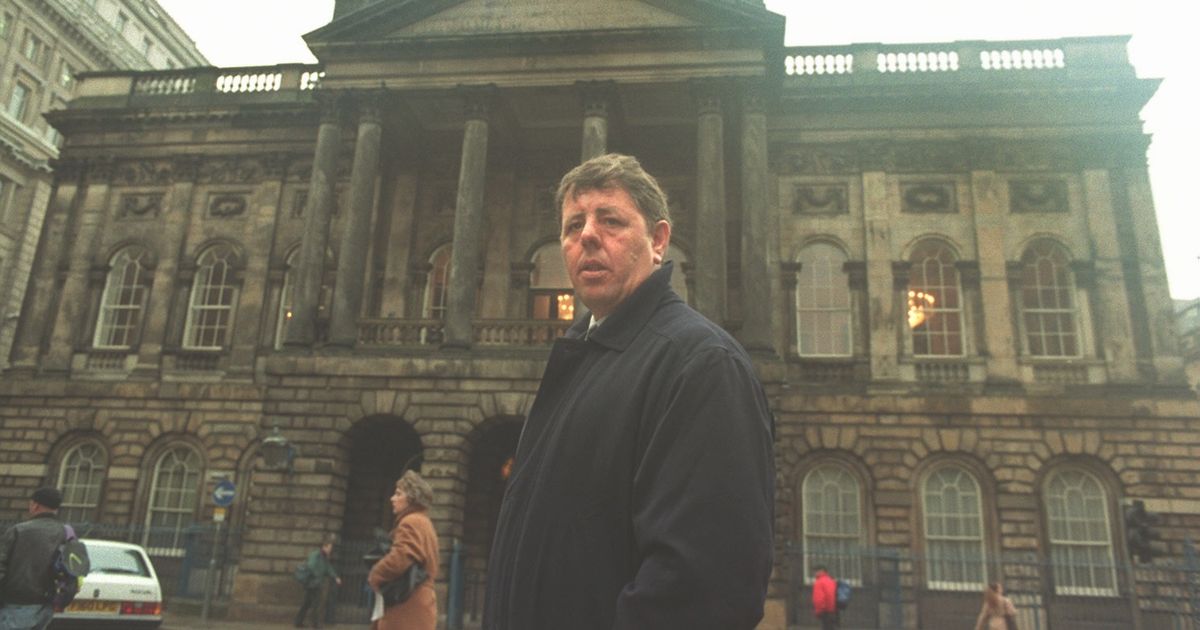George Knibb was respected across the political spectrum An archive picture of Councillor George Knibb outside Liverpool Town Hall(Image: Trinity Mirror Copyright)
An archive picture of Councillor George Knibb outside Liverpool Town Hall(Image: Trinity Mirror Copyright)
Tributes have been paid to a long-serving Liverpool councillor who died last month. George Knibb, who was in his late 70s, started as a gardener in the city before he was elected as a councillor in 1987 for the Everton ward.
The left wing politician entered the council in the wake of the expulsion of the Militant Tendency, which took control of the Labour group and council from the early 1980s until they were expelled from 1985 onwards. George soon quit Labour himself and became the leader of a small group of other left-wingers on the council called Ward Labour.
When Jeremy Corbyn became Labour leader, he re-joined the party and became a councillor in Norris Green in 2019.
His brother Phil Knibb previously served as a director for the Alt Valley Community Trust and North Liverpool Regeneration Company.
Those who knew George said he was a private man who opted for a low-key funeral, which took place yesterday.
In a message posted on X last night, Liverpool West Derby MP and former councillor Ian Byrne said: “I’m really disappointed I couldn’t attend today’s tribute in Liverpool to a brilliant comrade, George Knibb.
 George Knibb, wearing the blue shirt and yellow tie, celebrates his win in the 1999 local council elections(Image: Trinity Mirror Copyright)
George Knibb, wearing the blue shirt and yellow tie, celebrates his win in the 1999 local council elections(Image: Trinity Mirror Copyright)
“George will be deeply missed by so many. He was a man whose politics and principles I admired hugely.
“A true socialist and a person of great integrity. He stood out like a beacon on the council when we served together.
“My heartfelt condolences to Phil and all the family. Rest in Power, George.”
In a lengthy statement released on his blog last night, Liberal Democrat councillor Richard Kemp, from the Penny Lane Ward, said George was a close friend of his despite their political differences and during his last two years in office “sat as as a councillor by himself, rarely speaking in council but when he did, he did so with both passion and compassion.”
Cllr Kemp added: “So how did he become a friend of mine and someone I could work with for some of the causes that we both held dear? It was basically because we wanted to achieve the same things but had a different method of achieving them.
“We both wanted to see good housing for all people, first class education for all children, a green, clean, and safe environment for all people, and a levelling of the income gap which makes some people appallingly rich and some people appallingly poor.
“His route to achieve this was socialism, which is why he could not stay in the right-wing Blue Labour of Blair or Starmer. My route to achieving these things is by liberalism and empowerment of people as individuals and localised groups rather than through the sole intervention of the state.
“We had other things in common as well. Neither a Lib Dem or a left-wing socialist joined a party and then joined a council for personal enrichment or a step up on a political ladder.
 Cllr George Knibb and Mrs Easten, head teacher of holy cross and St Marys RC School outside Adlington House in Liverpool city centre, where there was a proposal to site a mobile phone mast(Image: Trinity Mirror Copyright)
Cllr George Knibb and Mrs Easten, head teacher of holy cross and St Marys RC School outside Adlington House in Liverpool city centre, where there was a proposal to site a mobile phone mast(Image: Trinity Mirror Copyright)
“Sometimes we have both been unpopular within our parties because we stridently supported things that we believed in and when we thought our party was back sliding on a key principle.
“The lesson that this teaches me is that we should strive as politicians to be more supportive of each other.
“I am in the party because I believe in its principles, in the vast majority of policies and the realisation that no one-man band will never achieve much influence over any of the terrible things that I think are happening in today’s world.
“So today I chatted to many people I have known for 50 plus years. I joked that I had to walk past most of them who were picketing me or a meeting that I was at waving placards denouncing what I was doing!
“But none of that mattered today. We had come together with one accord across the left-wing political divide and that was to recognise a ‘good man.’ Perhaps, at the end of the day the best that we can hope for is that we too will, in our turn, be recognised as a good man or woman.
“Thanks for your life, George. It was good to know you.”
